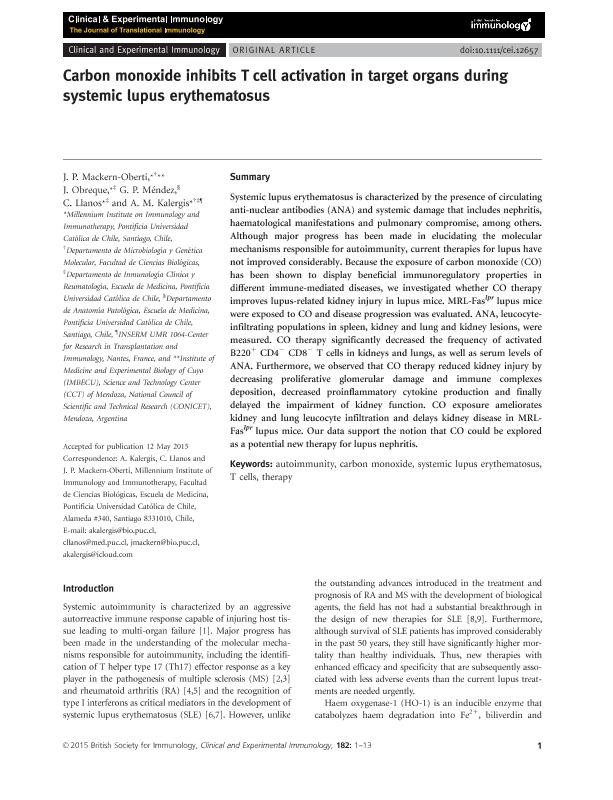Mostrar el registro sencillo del ítem
dc.contributor.author
Mackern Oberti, Juan Pablo

dc.contributor.author
Obreque, J.
dc.contributor.author
Méndez, G. P.
dc.contributor.author
Llanos, Carolina
dc.contributor.author
Kalergis, Alexis
dc.date.available
2023-09-04T12:39:58Z
dc.date.issued
2015-07
dc.identifier.citation
Mackern Oberti, Juan Pablo; Obreque, J.; Méndez, G. P.; Llanos, Carolina; Kalergis, Alexis; Carbon monoxide inhibits T cell activation in target organs during systemic lupus erythematosus; Oxford University Press; Clinical and Experimental Immunology; 7-2015; 1-13
dc.identifier.issn
0009-9104
dc.identifier.uri
http://hdl.handle.net/11336/210329
dc.description.abstract
Systemic lupus erythematosus is characterized by the presence of circulating anti-nuclear antibodies (ANA) and systemic damage that includes nephritis, haematological manifestations and pulmonary compromise, among others. Although major progress has been made in elucidating the molecular mechanisms responsible for autoimmunity, current therapies for lupus have not improved considerably. Because the exposure of carbon monoxide (CO) has been shown to display beneficial immunoregulatory properties in different immune-mediated diseases, we investigated whether CO therapy improves lupus-related kidney injury in lupus mice. MRL-Faslpr lupus mice were exposed to CO and disease progression was evaluated. ANA, leucocyte-infiltrating populations in spleen, kidney and lung and kidney lesions, were measured. CO therapy significantly decreased the frequency of activated B220+ CD4- CD8- T cells in kidneys and lungs, as well as serum levels of ANA. Furthermore, we observed that CO therapy reduced kidney injury by decreasing proliferative glomerular damage and immune complexes deposition, decreased proinflammatory cytokine production and finally delayed the impairment of kidney function. CO exposure ameliorates kidney and lung leucocyte infiltration and delays kidney disease in MRL-Faslpr lupus mice. Our data support the notion that CO could be explored as a potential new therapy for lupus nephritis.
dc.format
application/pdf
dc.language.iso
eng
dc.publisher
Oxford University Press

dc.rights
info:eu-repo/semantics/openAccess
dc.rights.uri
https://creativecommons.org/licenses/by-nc-sa/2.5/ar/
dc.subject
Carbon monoxide
dc.subject
immunotheraoy
dc.subject
autoimmunity
dc.subject
lupus
dc.subject.classification
Bioquímica y Biología Molecular

dc.subject.classification
Ciencias Biológicas

dc.subject.classification
CIENCIAS NATURALES Y EXACTAS

dc.title
Carbon monoxide inhibits T cell activation in target organs during systemic lupus erythematosus
dc.type
info:eu-repo/semantics/article
dc.type
info:ar-repo/semantics/artículo
dc.type
info:eu-repo/semantics/publishedVersion
dc.date.updated
2023-08-28T13:26:37Z
dc.journal.pagination
1-13
dc.journal.pais
Estados Unidos

dc.description.fil
Fil: Mackern Oberti, Juan Pablo. Consejo Nacional de Investigaciones Científicas y Técnicas. Centro Científico Tecnológico Conicet - Mendoza. Instituto de Medicina y Biología Experimental de Cuyo; Argentina. Pontificia Universidad Católica de Chile; Chile
dc.description.fil
Fil: Obreque, J.. Pontificia Universidad Católica de Chile; Chile
dc.description.fil
Fil: Méndez, G. P.. Pontificia Universidad Católica de Chile; Chile
dc.description.fil
Fil: Llanos, Carolina. Pontificia Universidad Católica de Chile; Chile
dc.description.fil
Fil: Kalergis, Alexis. Pontificia Universidad Católica de Chile; Chile
dc.journal.title
Clinical and Experimental Immunology

dc.relation.alternativeid
info:eu-repo/semantics/altIdentifier/doi/http://dx.doi.org/10.1111/cei.12657
Archivos asociados
